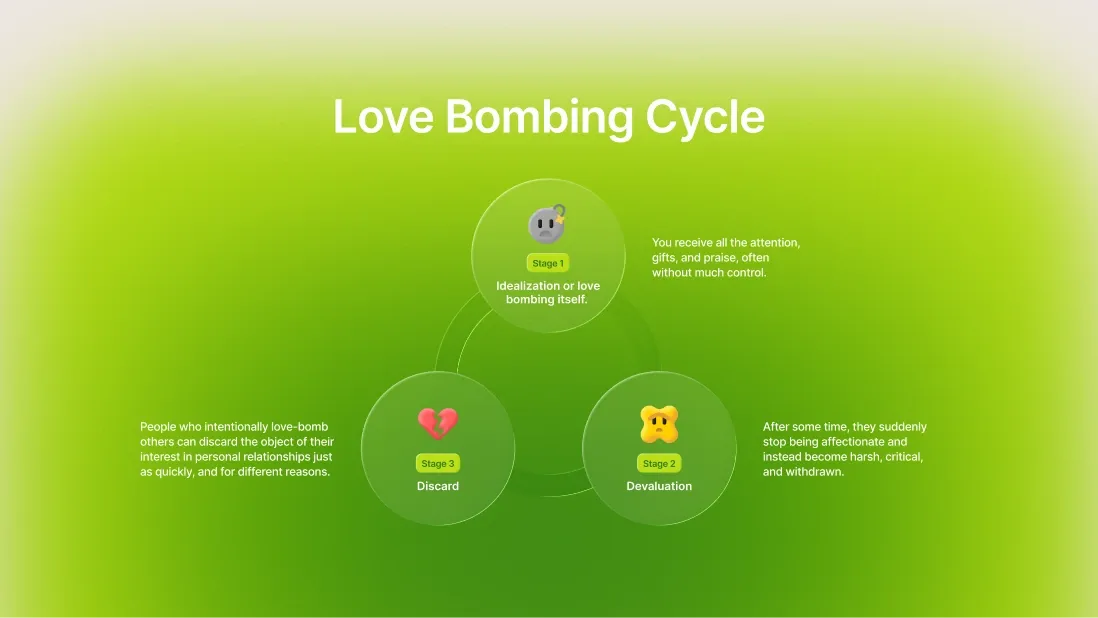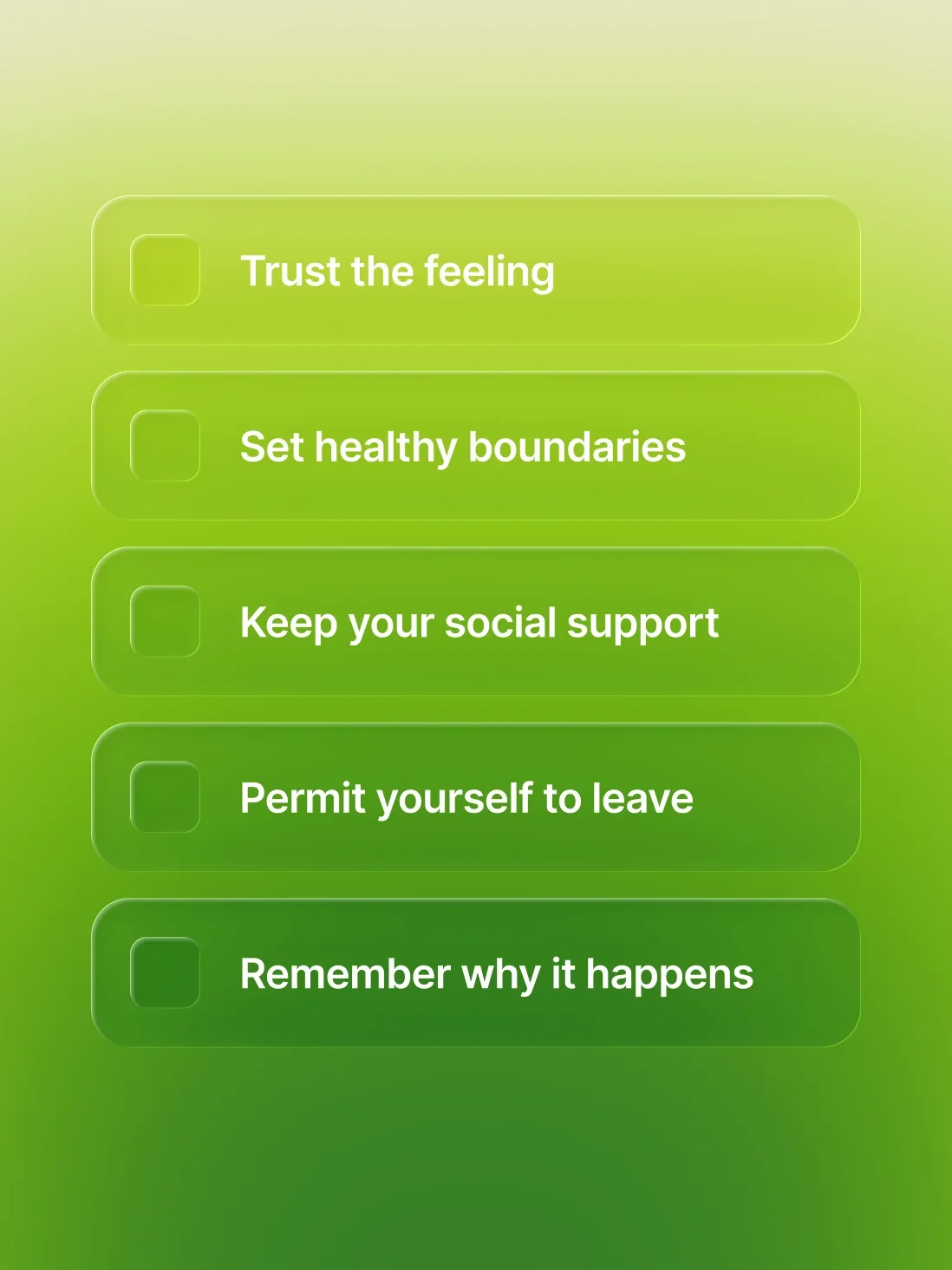“I Love You So Much”: Love Bombing Examples and Spotting the Signs

Ever felt like you were in a perfect situation that somehow felt a bit… off? Picture this: you’re in a new relationship, dating someone for a month or so, and your romantic partner feels like a perfect match in all things — from the movies they watch to how easily they admit their faults during arguments. When you send one “good morning,” they send you three messages filled with emotion. And they’ve been suggesting moving in together soon. But why are you feeling like it’s all a bit too much? You may be experiencing love bombing.
In a world where so many people admit to not having partners who are committed enough, someone who is ready to do so much without hesitation might feel like a gem. There may be moments when we are particularly tender with new people in our lives, but there are also moments when such bright, intense affection reveals a different sort of attitude.
You can learn to recognize the difference between true love and love bombing and make decisions to protect your mental health.
Key Learnings
- Love bombing is characterized by disregarding boundaries, showering you with excessive affection, lavish flattery, constant communication, and rapid relationship progression.
- The love bombing cycle has these three stages: Idealization, Devaluation, and Discard.
- The fundamental difference between love bombing and genuine love lies in pace, intention, and respect.
How to Recognize Love Bombing
Love bombing is often very subtle. Most people don’t really notice it because it often appears to be genuine affection. However, it is one of the forms of emotional and psychological abuse that happens in romantic relationships, in families, and in friendships. While it may seem that the other person loves you intensely, there is often a lack of mutual respect in such a relationship because it is unequal in nature. We've identified the most common signs of love bombing, along with real-world examples of how they might manifest in relationships.
1. Constant Communication
We are children of the digital age, so it’s natural for us to admire and appreciate the amount of effort some people put into texting and calling us. We see it as deep affection. We respect the regular messages because they show that the other person thinks about us. Over time, though, it feels excessive, and you find yourself being unable to respond on time or with the same degree of dedication.
Examples:
- They text you “good morning” and “good night” every day, plus dozens of text messages in between asking where you are or what you’re doing.
- You notice they get upset or anxious if you don’t reply immediately, even when you’re busy or dedicate your time to other relationships.
2. Excessive Compliments
Love bombing is supposed to make you feel seen and loved without questioning why. Love bombers offer you excessive affection as a manipulative tactic to establish control. They praise you so intensely that it feels more like excessive flattery than genuine admiration, but it can get you hooked.
Examples:
- During early stages, they call you “the most amazing person I’ve ever met” or say “It’s like I’ve never felt more understood.”
- They idealize you to an unrealistic level. They may say you’re “perfect” or “too good to be true.” The catch? It may later become criticism if you don’t fit into this idealized picture.
3. Guilt Tripping
Those of us who are prone to people-pleasing may be particularly vulnerable to it, as it is often associated with feelings of shame and guilt. Do you feel guilty if you try to address their manipulative behaviors? Be cautious of this sign: the moment you want to pull away, the love bomber might use guilt to pull you back. They may suddenly have problems with money, family, or health. You may notice that all of these issues suggest that you might come in and help out with them.
Unfortunately, love-bombers can also accuse others of emotional abuse to gaslight you, which allows them to exert control over the narrative.
Examples:
- If you try to slow things down and move at a natural pace, they respond with something like, “I guess you don’t care about me like I care about you.”
- The moment you have an argument and try to set boundaries, they suddenly have social media posts about people abandoning or hurting them.
4. Over-the-Top Gifts or Gestures
You receive gifts on random occasions, and they aren’t your average nice dessert or a bouquet — it can be something more extravagant, like a weekend trip or an expensive spa day. You get the royal treatment every time you meet. Most people view gift-giving as a positive act, rather than one of the signs of love bombing. And yet, you feel a strange sense of indebtedness after every grand gesture from your love interest.
Examples:
- They surprise you with overwhelming gifts after only a few dates.
- They invite you to spend time together at a rich resort, when you aren’t even sure if you want to be serious about each other.
5. Fast-Paced and Overwhelming Intimacy
Love-bombers talk about serious intimate relationships in just a few days of your relationship formation. They can push you to be together all the time or even suggest moving in together to maintain control over you. Aside from the lavish gifts we have mentioned above, they also try to be present in all aspects of your life, meeting your family members and joining you in all your hobbies.
Examples:
- They say “I love you” within days or weeks.
- They seem to have little personal physical or emotional boundaries, and encourage you to mirror this.
These aren’t all — there are hundreds of signs and examples of love bombing; they often vary from person to person. But here are the three main hints that will help you recognize love bombing:
- These people are intense.
- They disregard your boundaries.
- Their affection is conditional.
If you notice that some of these occur repeatedly in your life, it might be a sign that you are being love-bombed. If you feel like you need to get more information about how you act in a relationship and what you need, take the quiz to get your personalized plan for healthier relationships.
Why Love Bombing Happens: A Psychological Look
Love bombing behaviors aren’t always conscious. Although many individuals do it consciously to gain control or for emotional reasons, it’s not always the case. Some people love-bomb due to self-esteem or mental health issues. A trauma-informed therapist, Amelia Kelley, states that people engage in love bombing in a new relationship for different reasons:
“People who love bomb their partners are doing so from a place of insecurity. Deep down, they fear that their partner won't like them for their true self or will leave them, so they act out in unhealthy and abusive ways… Relationship anxiety can ‘birth’ love bombing.”
Just like other mechanisms people aren’t always aware of, they can love-bomb a potential partner or a friend out of fear of being left alone. Sometimes, it stems from an insecure attachment style or a lack of clear boundaries.
Nevertheless, when love bombing is conscious, it is manipulative and is often, as Kelley put it, a start of abusive relationships. This is an attempt to make you dependent on the other person, and they are using methods that will bind you and develop emotional dependence — or, sometimes, even physical or financial dependence.
Love Bombing Cycle
One theoretical approach to love bombing suggests it occurs in cycles. Not everyone who engages in love bombing does so; this dynamic is about an unhealthy focus that doesn’t bring genuine love. Because love bombing is usually viewed as one of the forms of emotional abuse, its stages also work against the person on the receiving end of this behavior. Here are the three stages of love bombing behaviors:

Stage # 1: Idealization or love bombing itself. You receive all the attention, gifts, and praise, often without much control. It might feel like you have gained momentum and understand the other person perfectly. Even more, a new partner seems to understand you immediately. It’s like living in the best love or friendship story ever created. This sets the stage for an emotional connection that creates an expectation for them to give you attention and for you to receive it. Sometimes, it also develops a sense of indebtedness.
Stage #2: Devaluation. After some time, they suddenly stop being affectionate and instead become harsh, critical, and withdrawn. Before that, you felt like you were on a pedestal. At this stage, you feel thrown off by the same person who put you there in the first place, and your self-esteem suffers. They can become emotionally or physically abusive.
Stage #3: Discard. People who intentionally love-bomb others can discard the object of their interest in personal relationships just as quickly, and for different reasons. Sometimes it can happen because you push back and set boundaries. In other cases, it happens because they no longer benefit from you. The relationship ends.
Sometimes, if the relationship is toxic and continues for a long time, this cycle can repeat all over again. Some people notice their partners suddenly returning to their kind selves the moment they try to move on.
Why Do We Fall for It?
So, why do we allow some people to have such a profound impact on us? When we are treated with kindness and generosity, our brain responds with a surge of happiness from the overwhelming affection we receive. We begin to associate the person who has been love-bombing us with positive emotions. Even if we are logical and rational to the extreme, we come to expect the same treatment. Several users from r/domesticviolence on Reddit have shared their feelings of being love-bombed. One particular stands out as especially vulnerable:
“I was usually so uncomfortable with emotion & intimacy. But with him, it felt so right. I thought there was no way it could be wrong when it felt so good and right.“
Even people with insecure attachment styles who are not used to trusting others can become victims of love bombing.
It mirrors intermittent reinforcement, a psychological process where unpredictable rewards create the strongest emotional bonds. We don’t know when to expect the affection. When the love bomber switches between affection and withdrawal, your brain learns to chase the next “high,” deepening emotional dependence. Quite often, love bombing confuses us and triggers overthinking, which in turn leads to self-doubt; we overlook all the impact the other person has on us. That is why we need to learn to trust ourselves.
Love Bomber vs. Genuine Affection: How to Tell the Difference
It’s challenging to recognize love bombing, especially at the start of a relationship when emotions are high. The real difference lies in pace, intention, and respect for boundaries.
Things Go Slower
Often, love-bombing involves progressing the relationship unnaturally quickly. Diane Strachowski, a certified cognitive therapist, explains the pace from a love bomber’s perspective:
“The insecure person doesn’t want you to be ambivalent with them. They want to get to a commitment quickly. "And if I give you lots of gifts, and if I shower you, and if I tell you you’re the one right away, I’m gonna hook you quicker so I don’t have to feel the ambivalence from you.”
Healthy affection grows naturally. You get to know each other over time, and closeness develops through shared experiences. Listen to yourself: Do you feel that the connection is real, not pressured?
Boundaries and Personal Space Exist
Love-bombers feel uncomfortable around someone’s boundaries and personal space because it means they cannot control the other person’s emotional reaction. People in healthy relationships will encourage you to express your individuality in a way that feels comfortable. They will respect your time alone and your time with others.
It Feels Steady and Consistent
Real love is a gradual process where the relationship moves at a mutually safe pace. One of the red flags about love bombing is that it feels like a carousel of emotions. You chase highs and try to get through the lows as they go. When your partner loves you, you can observe honest expressions of their affection and care. They don’t pull you into a whirlwind romance and then ghost you for a week. Ask yourself: Can you be certain that they will be for you tomorrow, the next day, or the next week? Can you seek support from them, rely on them being there for you?
They Want to Show Love
It might be a bit more challenging to spot this one, but you can observe an individual’s intention by examining the pattern over time. Healthy relationships are about people doing things for you because they want to support and love you. Think about your relationship. If your partner starts to help you control or manipulate you, it means they have another agenda.
What to Do If You’re Experiencing Love Bombing
Now, what do we do with love bombing? Some of these tips help you filter love-bombers, while others ensure you stay in a healthy and trustworthy relationship.

Trust the Feeling
Many people overlook the unusual discomfort they experience during their first meeting with someone and seek a logical explanation. Listen to yourself — quite often, our nervous system tells us something we don’t notice. Our intuition, which actually has a strong neural basis, tells us when something’s off based on external cues we don’t fully process.
Set Healthy Boundaries
Healthy boundaries and self-respect are natural repellents to people who want to take too much from others. Protect your mental well-being. When you meet new people and immediately present yourself as having personal boundaries, love-bombers will avoid you.
The same works for people you already know. If the person you’ve been seeing suddenly shows red flags, it is totally okay to slow down and set some firm boundaries. It doesn’t mean you need to cut them off immediately, but you can show what your comfort zone is. Notice how they respond to this, as handling criticism and boundaries well is a key difference between real love and love bombing.
Keep Your Social Support
Love bombing often leads to social isolation. People lose connections with their family and friends. Always stay in close contact with others and maintain strong communication. This allows you to have a reliable social network and also provides a side perspective on the situation you’re in. When we spend time with love-bombers, we may lose clarity on our relationship with them. When we seek support from others, it will bring us back to reality.
Permit Yourself to Leave
Leaving relationships is difficult. We put effort into building unique connections with ourselves. Sadly, it can also stop us from calling it quits. That’s when the sunk cost fallacy appears: we think that just because we spent time and effort on someone, it’s easier to go with it. If you have these thoughts, gently remind yourself that it’s not just “being rude” to them, it’s respecting your needs as a unique person.
Remember Why It Happens
If you’re going through a breakup, you might start to crave the same attention back. It’s a widespread concern on relationship subreddits, where users often share missing the same feelings they had. As one user has put it, “The reason [breaking up] is so hard IS that love bombing. You had an amazing experience showered with love, but the thing is it was never real.” It’s easy to go back on your breakup with love-bombers because they will shower you with attention. This is why staying clear-headed helps be more objective.
Breaking Free From Emotional Manipulation
Dealing with love bombing isn’t about doubting every close relationship you have. It is simply allowing yourself the right to protect and take care of your own peace. We enter relationships being ourselves, and those who appreciate us don’t need us to become someone else. As you go, think back on the connections you have and look at them from above: what makes them special, fun, and worth investing in? Take this warmth with you and use it as your strength.
References
- Beri, R. (2024). A study on love bombing, narcissism and emotional abuse among young adults in relationship and situationship. International Journal of Interdisciplinary Approaches in Psychology, 2(6), 22–46.
- Fischer, K. (2024, June 10). Love bombing: Meaning, signs, and examples. WebMD. https://www.webmd.com/sex-relationships/what-is-love-bombing
- Guy-Evans, O. (2025, September 12). ADHD and toxic relationships. Simply Psychology. https://www.simplypsychology.org/adhd-and-toxic-relationships.html
- Jellema, T., Macinska, S. T., O’Connor, R. J., & Skodova, T. (2024). Social intuition: Behavioral and neurobiological considerations. Frontiers in Psychology, 15. https://doi.org/10.3389/fpsyg.2024.1336363
- Naftulin, J. (2024, May 24). How to know if your partner is love bombing you or if they’re just anxious, according to a therapist. Business Insider. https://www.businessinsider.com/love-bombing-or-anxiety-2023-5
- Robson, A. (2022, February 22). “I work with Love bombing and gaslighting victims-these are 5 red flags.” Newsweek. https://www.newsweek.com/i-see-love-bombing-gaslighting-relationships-1679479
- Samokhval, V. (2025a, April 9). How does ADHD or ADD affect relationships?. Liven App. https://theliven.com/blog/wellbeing/overthinking/overthinking-and-self-doubt-build-self-confidence
- Samokhval, V. (2025b, July 24). Overthinking and self-doubt: Build self-confidence. Liven App. https://theliven.com/blog/wellbeing/overthinking/overthinking-and-self-doubt-build-self-confidence
FAQ: Love Bombing Examples
What is love bombing?
What are examples of love bombing?
What are narcissist love bombing examples?
What is the difference between love bombing and genuine love?
Are there early signs of love bombing I can watch for?
Can love bombing happen in friendships or family relationships?
How can I respond if I suspect love bombing?


